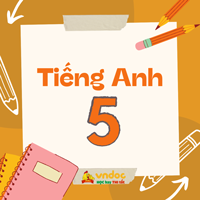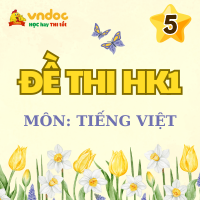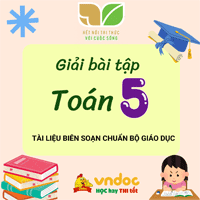Đề cương ôn thi học kì 2 lớp 5 môn tiếng Anh theo từng Unit
Lý thuyết tiếng Anh lớp 5 học kì 2 Global Success
Lớp:
Lớp 5
Môn:
Tiếng Anh
Dạng tài liệu:
Đề thi
Bộ sách:
Global Success
Loại:
Tài liệu Lẻ
Loại File:
Word + PDF
Phân loại:
Tài liệu Tính phí
Lý thuyết học kì 2 tiếng Anh 5 Global Success
Đề cương ôn tập học kì 2 tiếng Anh lớp 5 bao gồm trọn bộ Lý thuyết Từ vựng - Ngữ pháp tiếng Anh unit 11 - unit 20 lớp 5 Global Success giúp các em học sinh ôn tập hiệu quả.
| Vocabulary ( Từ vựng) | Structures ( Cấu trúc câu) | |
| Unit 11: Family time | 1. buy souvenirs : mua quà lưu niệm 2. collect seashells: thu lượm, đi lấy vỏ sò 3. eat seafood : ăn hải sản 4. see some interesting places: thăm những nơi thú vị 5. take a boat trip around the bay: đi du lịch bằng tàu thuỷ vòng quanh vịnh 6. walk on the beach : đi bộ trên bãi biển |
1. Cách hỏi ai đó đã làm việc gì trong quá khứ phải không 2. Cách hỏi ai đó đã làm gì ở đâu. What did + S + V + in + địa điểm? S + Ved/ cột 2 Ex: What did they do in Ha Long Bay? |
| Unit 12 : Our Tet holiday |
1. buy roses: mua hoa hồng 2. buy a branch of peach blossoms: mua một cành hoa đào 3. decorate the house: trang trí nhà 4. do the shopping: đi mua sắm 5. fireworks show : sự trình diễn pháo hoa 6. flower festival : hội chợ hoa 7. make banh chung: làm bánh chưng 8. make spring rolls: làm nem 9. New Year party: tiệc năm mới |
1. Cách hỏi ai đó sẽ làm gì cho dịp Tết phải không Will you + V+ for Tet? Yes, I will. No, I won’t. I’ll + V. Ex 1: Will you buy a branch of peach blossoms for Tet? Yes, I will. Ex 2: Will you make banh chung for Tet? No, I won’t. I’ll make spring rolls. 2. Hỏi ai đó sẽ đi đâu vào dịp Tết. Where will you go at Tet? I’ll go to + địa điểm Ex: Where will you go at Tet? I’ll go to my grandparents’ house in the countryside |
| Unit 13: Our special days |
1. apple juice: nước ép táo 2. at Mid-Autumn Festival vào Tết Trung thu 3. burgers (n) những bánh mì kẹp thịt 4. milk tea : trà sữa 5. pizza (n) bánh pizza 6. on Children’s Day: vào ngày Quốc tế Thiếu nhi 7. on Sports Day: vào ngày hội thể thao 8. on Teachers’ Day: vào ngày Nhà giáo Việt Nam |
1. Cách hỏi và trả lời về hoạt động sẽ làm vào dịp nào đó. What will you/ do on + dịp đặc biệt? We’ll + V Ex: What will you do on Children’s Day? We’ll dance. 2. Cách hỏi và trả lời về đồ ăn/ đồ uống gì sẽ có ở bữa tiệc . What food/ drinks will you/ she/he/ they have at the party? We’ll/ She’ll/ He’ll/ They’ll have + đồ ăn/ đồ uống Ex: What food will you have at the party? We’ll have fish and chips. |
| Unit 14: Staying healthy |
1. do morning exercise: thể dục buổi sáng 2. do yoga / tập yoga 3. drink fresh juice: uống nước ép trái cây tươi eat healthy food: ăn thức ăn có lợi cho sức khỏe 4. eat vegetables: ăn rau every day: mỗi ngày 5. once a week: một lần một tuần 6. play sportschơi thể thao 7. three times a week: ba lần một tuần 8. twice a week: hai lần một tuần |
1. Cách hỏi và trả lời xem ai đó làm gì để giữ gìn sức khoẻ. How does he/she stay healthy? He/ She + Vs/es. Ex: How does he stay healthy? He plays sports every day. 2. Cách hỏi và trả lời về tần suất ai đó làm việc gì. How often does he/she + V? He/ She + Vs/es + tần xuất Ex: How often does she eat vegetables? She eats vegetables every day. |
| Unit 15: Our health |
1. drink warm water: uống nước ấm 2. go to the dentist : đi khám nha sĩ 3. have a rest : nghỉ ngơi 4. headache (n): đau đầu 5. sore throat (n): đau họng 6. toothache (n): đau răng 7. stomach ache (n): đau dạ dày 8. take some medicine: uống thuốc 9. should: nên 10. Shouldn’t: không nên |
1. Hỏi và trả lời về các vấn đề sức khoẻ thường gặp. • What’s the matter? I have a/an + vấn đề sức khỏe • What’s the matter with him/ her? He/ She has a/an + vấn đề sức khỏe Ex 1: What’s the matter? I have a toothache What’s the matter with her? She has an earache. 2.Đưa ra lời khuyên khi ai đó gặp vấn đề gì. You should + V. You shouldn’t + V. Thanks for your advice. Ex: You should drink warm water. Thanks for your advice. |
| Unit 16: Seasons and weather |
1. autumn (n): mùa thu 2. spring (n): mùa xuân 3. summer (n): mùa hè 4. winter (n): mùa đông 5. cold (adj): lạnh 6. cool (adj): mát 7. hot (adj): nóng 8. jeans (n): quần bò 9. jumper (n): áo len cao cổ 10. trousers (n): quần dài 11. warm blouse: áo cánh ấm |
1. Hỏi và trả lời về thời tiết vào các mùa ở đâu như thế nào: How is the weather in + địa điểm + in + mùa? It is + tính từ. Ex: How is the weather in Nam Dinh in summer? It is hot and sunny. 2. Hỏi và trả lời bạn thường mặc gì vào các mùa khác nhau: What do you usually wear in + mùa? I wear +quần áo Ex: What do you usually do in winter? I wear jeans and a jumper. |
| Unit 17: Stories for children |
1. ant (n) con kiến 2. cook well: nấu ăn giỏi 3. crow (n) : con quạ 4. dwarfs (n): những chú lùn, người tí hon 5. fox (n): con cáo 6. grasshopper (n): con châu chấu 7. hare (n): con thỏ 8. tortoise (n): con rùa 9. Snow White (n): Nàng Bạch Tuyết 10. run fast: chạy nhanh 11. sing beautifully: hát hay 12. work hard: làm việc chăm chỉ |
1. Hỏi và trả lời ai là nhân vật chính trong truyện. Who are the main characters in the story? They are + nhân vật. Ex: Who are the main characters in the story? They are the hare and the tortoise. 2.Hỏi và trả lời xem nhân vật trong truyện đã làm gì như thế nào How did he/ she+ V? He/ She + Ved/ cột 2 + trạng từ Ex: How did she work? She worked hard. |
| Unit 18: Means of transport |
1. bicycle: xe đạp 2. bus: xe buýt 3. taxi: xe tắc xi 4. on foot: đi bộ 5. Dragon Bridge Cầu Rồng 6. Ha Noi Opera House: Nhà Hát lớn Hà Nội 7. Ho Chi Minh City Museum : Bảo tàng Hồ Chí Minh 8. Ngo Mon Square: Quảng trường Ngọ Môn |
1. Hỏi và trả lời bạn muốn đi đâu: Where do you want to visit? I want to visit + địa danh. Ex: Where do you want to visit? I want to visit Dragon Bridge. 2.Hỏi và trả lời ai đó muốn đi đâu. Where does he/ she want to visit? He/ She wants to visit + địa danh.He/ She wants to visit Thien Mu Pagoda. 3. Hỏi và trả lời làm cách nào/ dùng phương tiện gì để đi tới nơi nào đó: How can I get to + địa danh. You can get there by + phương tiện. Ex: How can I get to Hoan Kiem Lake? You can get there by bus. |
Trên đây là Lý thuyết tiếng Anh lớp 5 học kì 2 Global Success.











